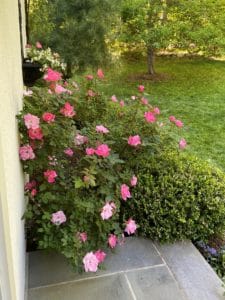Hello fellow readers, After meeting Stephen Scannilello and purchasing his book A Year of Roses, my love-hate relationship with the beauty and beast of roses turned to respect. As you may guess, the fairytale Beauty and the Beast has something to do with it. I hope you enjoy the story.

Rosa’ Dr. Van Fleet’ -Climbing-Roses
The Beauty and Beast of Roses
In the podcast version of last week’s story (Episode 71), I mention a hilarious story of my brother Rick in Tennessee. His roses became a feast for Tent Caterpillars. Once remedied by destroying the tent, a scarlet-and-green leafhopper came to feed.
It brings a memory of meeting rosarian and American Horticultural Society’s Book Award recipient, Stephen Scannilello. I heard him speak long ago and purchased his book even though I have a love-hate relationship with roses. Well, hate sounds harsh; I don’t think I hate anything other than maybe raw clams. They remind me of slimy slugs wreaking havoc in the garden.
While loving the array of fabulous colors, roses are fussy and take diligence to keep pests away. Even deer love them despite their prickliness!
Stephen Scannilello’s month-to-month “labor of love.”

A lovely park in Millburn, NJ.
In his book, A Year of Roses (2006), Stephen Scannilello describes the month-to-month “labor of love” necessary to keep roses healthy. Do roses take 12 months a year to maintain? Yes and no. Love and hate. Though after hearing him speak, I grew an admiration for rose experts.
“It’s important to keep up with deadheading since faded blooms can look unsightly and breed disease,” Scannilello writes. Need I say more?
The good news is that ‘Knock Out’ roses require relatively little care and flower prolifically. They push the old blooms out of the way when a new bud forms, eliminating the need to deadhead, and are highly resistant to insects and disease. So if I were to have roses, I’d choose the ‘Knock Out.’

Pat’s Knock-out Roses are doing well.
“Roses are heavy feeders.”
My dear friend and design colleague Marty Carson has magnificent roses I wrote about after seeing a Beauty and the Beast performance at Papermill Theater in Millburn, NJ, a few years back. On the way to the play, Marty mentioned how magnificent her roses are because of the previous year’s overabundance of rain. Her climbing roses (Rosa ‘Dr. Van Fleet’) are bursting with light pink blooms. The same is true of her ‘Knock Out’ Roses.
“Roses love lots of water and are heavy feeders,” she said, meaning they like fertile soil.
The story of Beauty and the Beast is filled with wisdom.
It was my first time seeing Beauty and the Beast, filled with wisdom for all of us. The story begins with a shoddily dressed older woman arriving at a castle asking for shelter from the cold. In return, she offered a rose to the prince. Repulsed by her appearance, the prince turns her away.
She transforms into a beautiful woman and casts a spell to teach the callous prince a lesson. One should never judge another based on appearances.
The prince turns into a Beast and his servants into household items. The curse can only be broken if he learns to love and is loved in return before the last petal of the rose fades and falls.
As the years go by, the Beast lingers in his castle, reeling in self-pity and lashing out at his help. The rose petals fade and fall.
At last, a maiden searching for her father finds her way into the castle. The Beast receives her ragefully and jails her for trespassing. Though frightened, the maiden boldly agrees to remain forever in exchange for her father’s freedom. After dramatic twists and turns, as in any fairytale, it ends happily ever after, and the rose comes back to life.

“All members in The Knock-Out Family of Roses are self-cleaning,” touts the grower’s website.
The benefits of ‘Knock Out’ roses
Back to ‘Knock Out’ roses. The shrub rose, Zones 3 to 9, can be easily rejuvenated yearly by cutting them back to twelve high inches in the winter. The grower claims they “perform beautifully even without fertilizing.” And go on to tout, “All members in The Knock Out Family of Roses are self-cleaning, so there is no need to deadhead,”
Of course, if you cut back the spent flowers, your roses will have a tidier appearance. But one should not judge another on appearances.
Garden Dilemmas? AskMaryStone@gmail.com (and your favorite Podcast App.)
There’s more to the story in the on-the-go version: Episode 72 of the Garden Dilemmas Podcast:
Link to a related story about Pat’s Rose Remedies
Link to Stephen Scannilello’s book A Year of Roses



Mary, loved this article. Will need to check out Stephen’s book. The lack of rain has been a challenge, for sure.
Thank you Pat, I am grateful that the rain has returned! I hope your beautiful roses are happy :^) Mary